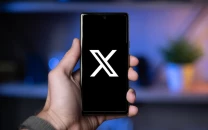Google shelves plan for modular smartphone
Axing Project Ara is one of the first steps in a campaign to unify Google’s various hardware efforts

Google logo PHOTO: REUTERS
The move marks an about-face for the tech company, which announced a host of partners for Project Ara at its developer conference in May and said it would ship a developer edition of the product this autumn.
'Google for publishers': Google's first-ever tech talk in Karachi
The company’s aim was to create a phone that users could customize on the fly with an extra battery, camera, speakers or other components.
A spokesperson for Google declined to comment on the matter.
While Google will not be releasing the phone itself, the company may work with partners to bring Project Ara’s technology to market, potentially through licensing agreements, one of the people with knowledge of the matter said.
Axing Project Ara is one of the first steps in a campaign to unify Google’s various hardware efforts, which range from Chromebook laptops to Nexus phones. Former Motorola president Rick Osterloh rejoined Google earlier this year to oversee the effort. Google sold Motorola Mobility to Lenovo Group in 2014.
Modular smartphones have generated great enthusiasm in the tech community for their potential to prolong the lifespan of a device and reduce electronic waste. But the devices are difficult to bring to market because their interchangeable parts make them bulky and costly to produce, said analyst Bob O’Donnell of TECHnalysis Research, adding that he was not surprised to see Google halt the project.
“This was a science experiment that failed, and they are moving on,” he said.
Google gives Faroe Islands a less woolly Street View
Project Ara was one of the flagship efforts of Google’s Advanced Technology and Projects group, which aims to develop new devices, but it had various stops and starts.
Last year, the company shelved plans to sell the modular phone in Puerto Rico with Latin American carriers.



















COMMENTS
Comments are moderated and generally will be posted if they are on-topic and not abusive.
For more information, please see our Comments FAQ